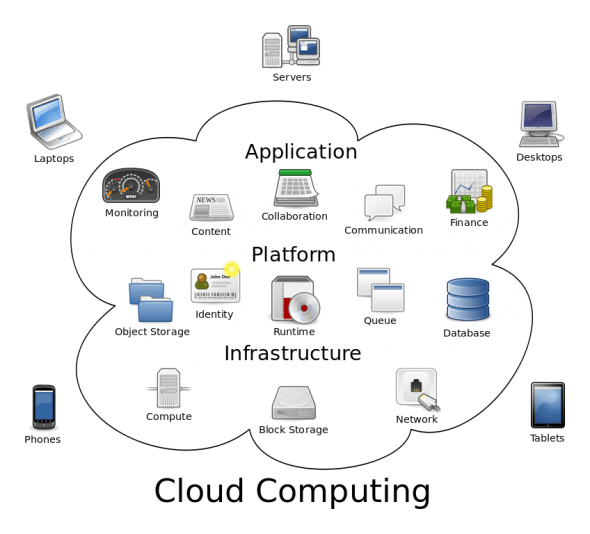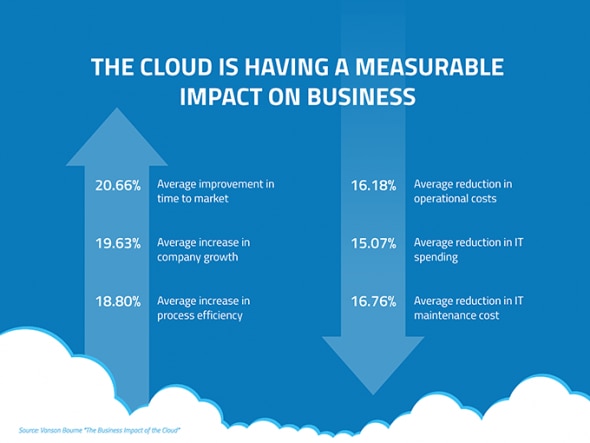In today’s rapidly advancing business world, the use of cloud computing has completely transformed how organizations function and create value. As we look ahead to 2024, industry experts predict a significant increase in the adoption and growth of cloud computing services, thanks to the numerous benefits they provide.
But what exactly are cloud computing benefits and how can they help drive your business towards success? In this article, we will explore 13 essential benefits a company can achieve by adopting cloud infrastructure.
How One AI-Driven Media Platform Cut EBS Costs for AWS ASGs by 48%


What is cloud computing?
Cloud computing is a term used to describe the use of hardware and software delivered via network (usually the Internet). The term comes from the use of cloud shaped symbol that represents abstraction of rather complex infrastructure that enables the work of software, hardware, computation and remote services.
Simply put, cloud computing is computing based on the internet. In the past, people would run applications or programs from software downloaded on a physical computer or server in their building. Cloud computing allows people access to the same kinds of applications through the internet.
Cloud computing is based on the premise that the main computing takes place on a machine, often remote, that is not the one currently being used. Data collected during this process is stored and processed by remote servers (also called cloud servers). This means the device accessing the cloud doesn’t need to work as hard.
By hosting software, platforms, and databases remotely, the cloud servers free up the memory and computing power of individual computers. Users can securely access cloud services using credentials received from the cloud computing provider.

Cloud computing benefits
Here’s a list of key benefits an enterprise can expect to achieve when adopting cloud infrastructure.
1. High Speed – Quick Deployment
The ability to spin up new cloud computing instances in a matter of seconds reshaped the agility and speed of software development. Developers can easily test new ideas and design application architecture without the dependency on on-site hardware limitations or slow procurement processes.
2. Automatic Software Updates and Integration
Continuous Integration and Continuous Delivery rely on the fact that new software versions can be easily tested and deployed in the cloud environment, which allows for higher velocity of product innovation, releasing more and more features to the end-users on a monthly, weekly and in some cases even daily basis. Cloud environments also integrates with common DevOps tools and logging systems which makes it easier to monitor and detect issues in production.
3. Efficiency and Cost Reduction
By using cloud infrastructure, you don’t have to spend huge amounts of money on purchasing and maintaining equipment. This drastically reduces CAPEX costs and Total Cost of Ownership (TCO). You don’t have to invest in hardware, facilities, utilities, or building out a large data center to grow your business. You do not even need large IT teams to handle your cloud data center operations, as you can enjoy the expertise of your cloud provider’s staff.
Cloud also reduces costs related to downtime. Since downtime is rare in cloud systems, this means you don’t have to spend time and money on fixing potential issues related to downtime.
4. Data Security
One of the major concerns of every business, regardless of size and industry, is the security of its data. Data breaches and other cybercrimes can devastate a company’s revenue, customer loyalty and brand positioning.
Cloud offers many advanced security features that guarantee that data is securely stored and handled. Features like granular permissions and access management via federated roles can restrict access to sensitive data only to the employees that need access to it, and by that reducing the attack surface for malicious actors.
Cloud storage providers implement baseline protections for their platforms and the data they process, such as authentication, access control, and encryption. From there, most enterprises supplement these protections with added security measures of their own to bolster cloud data protection and tighten access to sensitive information in the cloud.
5. Scalability
Different companies have different IT needs — a large enterprise of 1000+ employees won’t have the same IT requirements as a start-up. Using the cloud is a great solution because it enables enterprises to efficiently — and quickly — scale up/down their IT departments, according to business demands.
Cloud-based solutions are ideal for businesses with growing or fluctuating bandwidth demands. If your business demands increase, you can easily increase your cloud capacity without having to invest in physical infrastructure. This level of agility can give businesses using cloud computing a real advantage over competitors.
This scalability minimizes the risks associated with in-house operational issues and maintenance. You have high-performance resources at your disposal with professional solutions and zero up-front investment. Scalability is probably the greatest advantage of the cloud.

6. Collaboration
Cloud environments enables better collaboration across teams: developers, QA, operations, security and product architects are all exposed to the same infrastructure and can operate simultaniously without stepping on each other toes. Cloud roles and permissions help with better visibility and monitoring on who did what and when, to avoid conflicts and confusion. Different cloud environments can be built for specific purposes like staging, QA, demo or pre-production. It’s much easier to collaborate in a transparent manner and the cloud encourages it.
7. Unlimited Storage Capacity
Related to the scalability benefit above, the cloud has essencially unlimited capacity to store any type of data in various cloud data storage types, depending on the availability, performance and frequency the data has to be accessed. The rule of thumb is that the cost of storage goes up according to the levels of availability of the data, performance and access frequency. Creating and optimizing the cloud cost stucture policy can reduce the cost of cloud storage significantly while maintaining the company’s business goals related to data storage in the cloud.
8. Back-up and Restore Data
The fact that data can be stored in the cloud without capacity constrains also helps with backup and restore purposes. As end-users data changes over time and needs to be tracked for regulations or compliance reasons, older software versions can be stored for later stages, in cases they would be needed for recovery or rollback.
9. Disaster Recovery
Having previous versions of software stored in the cloud, and having production instances running on multiple cloud availability zones or regions allow for faster recovery from disasters: if your application is deployed on multiple locations and for some reason one region goes down – the traffic can automatically failover to the working regions without any interruptions to the end-users. In other cases where there is a major bug in the software release, a quick rollback can be initiated to restore a previously released, more stable version to minimize damage.
10. Mobility
Cloud computing allows mobile access to corporate data via smartphones and devices, which is a great way to ensure that no one is ever left out of the loop. Staff with busy schedules, or who live a long way away from the corporate office, can use this feature to keep instantly up-to-date with clients and coworkers.
Resources in the cloud can be easily stored, retrieved, recovered, or processed with just a couple of clicks. Users can get access to their works on-the-go, 24/7, via any devices of their choice, in any corner of the world as long as you stay connected to the internet. On top of that, all the upgrades and updates are done automatically, off-sight by the service providers. This saves time and team effort in maintaining the systems, tremendously reducing the IT team workloads.
11. Data Loss Prevention

Data loss is a major concern for all organizations, along with data security. Storing your data in the cloud guarantees that data is always available, even if your equipment like laptops or PCs, is damaged. Cloud-based services provide quick data recovery for all kinds of emergency scenarios – from natural disasters to power outages.
Cloud infrastructure can also help you with loss prevention. If you rely on a traditional on-premises approach, all your data will be stored locally, on office computers. Despite your best efforts, computers can malfunction for various reasons — from malware and viruses to age-related hardware deterioration, to simple user error.
But, if you upload your data to the cloud, it remains accessible for any computer with an internet connection, even if something happens to your work computer.
12. Control
Having control over sensitive data is vital to any company. You never know what can happen if a document gets into the wrong hands, even if it’s just the hands of an untrained employee.
Cloud enables you complete visibility and control over your data. You can easily decide which users have what level of access to what data. This gives you control, but it also streamlines work since staff will easily know what documents are assigned to them. It will also increase and ease collaboration. Since one version of the document can be worked on by different people, and there’s no need to have copies of the same document in circulation.
13. Competitive Edge
Not every company will migrate to the cloud, at least not yet. However, organizations which adopt cloud find that many benefits that cloud offers positively impacts their business .
Cloud adoption increases every year, since companies realize that it offers them access to world-class enterprise technology. And, if you implement a cloud solution now, you’ll be ahead of your competitors.
Conclusion
Cloud computing adoption is on the rise every year, and it doesn’t take long to see why. Enterprises recognize cloud computing benefits and see how they impact their production, collaboration, security and revenue.
By using a cloud-based solution, an enterprise can prevent a lot of problems that plague organizations that rely on on-premises infrastructure.
If you have any questions about how to effectively adopt the cloud for your business, or how to optimize your cloud performance and reduce costs, contact us today to help you out with your performance and security needs.







